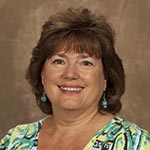Now that the Next Generation Science Standards (NGSS) have been developed and released, the real work begins: Helping states implement the standards.

Washington University in St. Louis’ Institute for School Partnership, under the leadership of Executive Director Victoria L. May, is taking an active role in helping with that implementation – especially in its home state of Missouri.
For starters, May, assistant dean of Arts & Sciences, and four other delegates from Missouri attended a national conference of the Council of State Science Supervisors in early June.
The “Building Capacity for State Science Education” conference was held in Pittsburgh June 7-8 and was designed to provide each state the opportunity to share deeper understanding of the implications of adopting NGSS and help with implementation strategies.
“The focus of the conference was bringing the standards to the classroom and school level, really trying to get teachers and school administrators to understand the strengths of NGSS and why it needs to be implemented state to state,” May said. “‘How will this affect your teaching? How will this affect your classroom?’”
In Missouri, the next steps will be to raise awareness of the standards throughout the state. Beginning this summer, representatives from the Science Teachers of Missouri will present regional workshops for teachers throughout the state. Next, the Missouri Department of Elementary & Secondary Education will lead an effort to convene stakeholders throughout the state to review the NGSS and make recommendations.
The NGSS, new guidelines for science education in the United States, were released in April. Twenty-six states and their broad-based teams worked together for two years with a 41-member writing team and partners to develop the standards, which identify science and engineering practices and content that all K-12 students should master to be fully prepared for college, careers and citizenship.
“NGSS is a whole new vision of what it means to be scientifically literate,” May said. “We’re moving from standards that were very fact-based — telling students ‘here’s all the information you need to know’ — to a much more conceptual approach because of the information age.”
“The standards really are much more focused on ‘what does it mean to do science’ and the process of engineering. It’s how to ask the questions, how to pose the problems, how to think things through. That’s what the ISP has been about all along.”
Among the focus areas of the conference were implementation strategies and resources; professional development; state needs assessments of the science education system; strategic planning for implemention and sessions on general understanding of the nuances of NGSS.
Besides May, the Missouri delegation consisted of:
- Shaun Bates, science education consultant, Missouri Department of Elementary & Secondary Education, Jefferson City;
- Nicole Riegel, executive director, SySTEMic Innovations, Kansas City;
- Troy D. Sadler, professor of science education and director, MU Science Education Center at the University of Missouri, Columbia; and
- Jan VanGilder, Southwest Center for Educational Excellence, Webb City.
To read more about the NGSS, visit here. To read about the ISP’s work, visit here.